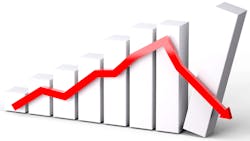The one-two punch of global tariff wars and a global pandemic have wiped out 11 years of economic growth, according to the monthly PMI index from the Institute for Supply Management.
The April PMI plummeted 7.6 percentage points to 41.5%, driven by sharp declines in new orders, production and employment. Not only is the April PMI at its lowest level since the Great Recession of 2008, the drop was the fastest since a 9-percentage point fall in April 2009.
And Timothy R. Fiore, chairman of the ISM’s Manufacturing Business Survey Committee, said the index might not tell the full story. “From a pure demand and material-conversion standpoint, discounting the oversized influence in the ability to obtain supply, the economic contraction in April was likely sharper than the traditional PMI calculation indicates,” Fiore said in a press release.
The PMI has two measurements. The baseline for overall growth in manufacturing is 50%, and the April PMI is 17% below the growth rate. But the index also measures overall growth in the U.S. economy. That threshold is 42.5% and the April PMI is below that growth level for the first time in almost 11 years.
In August 2018, the PMI was over 60%, which is 20% above the PMI growth rate for manufacturing of 50%. The tariff wars between the United States and China followed, and the index began to decline steadily, hovering near that 50% mark for much of 2019 and the first part of 2020.
The COVID-19 pandemic has further crushed the global manufacturing economy and it had a direct impact on the decline in the monthly index. The New Orders Index fell 15.1 percentage points to 27.1%, the Production Index dropped 20.2 percentage points to 27.5% and the Employment Index crashed 16.3 percentage points to 27.5%.
Survey committee members discussed the impact of the COVID-19 as part of the monthly report, including some manufacturers able to survive due to impacts of COVID-19 on the health care and food service industries.
“Comments from the panel were strongly negative (three negative comments for every one positive comment) regarding the near-term outlook, with sentiment clearly impacted by the (COVID-19) pandemic and continuing energy market recession,” Fiore said. “The PMI indicates a level of manufacturing-sector contraction not seen since April 2009, with a strongly negative trajectory.”
Among the committee members’ comments:
- “[A] 30% decrease for April due to COVID-19 impact on both customers and suppliers.” (Computer & Electronic Products)
- “Production stopped, other than to make hand sanitizer for those in need.” (Chemical Products)
- “COVID-19 has created a wave of activities, including vendors closing, vendors focusing only on the medical industry, employees not coming to work, delayed shipments from overseas.” (Transportation Equipment)
- “The food processing B2B space remains steady. We are weathering the storm. There is a fortunate increased need for packaged foods. Softening is showing through in some products that find their way into food service and lodging.” (Food, Beverage & Tobacco Products)
- “Our refinery is losing money making gasoline due to the falling demand.” (Petroleum & Coal Products)
- “We supply the construction industry in various ways, where the slowdown has been a bit slower than most industries. It is, however, beginning to impact our business, and we see more challenges on the horizon.” (Fabricated Metal Products)
- “The company I work for manufactures personal protective equipment [PPE], specifically N95 masks, face shields, as well as selling protective clothing and hand protection. In the area of PPE, our backlog has spiked to numbers we have never seen. While no doubt some of the backorders will be canceled, many of the orders are longer term commitments from [the] U.S. government.” (Apparel, Leather & Allied Products)
- “Our packaging business is starting to see signs of a slowdown in May after two strong months into COVID-19.” (Paper Products)
- “COVID-19 has destroyed our market and our company. Without a full recovery very soon, and some assistance, I fear for our ability to continue operations.” (Nonmetallic Mineral Products)
- “Dealing with the effects of coronavirus and having 65% of our operations down.” (Furniture & Related Products)
About the Author
Bob Vavra
Senior Content Director, Power & Motion and Machine Design
Bob Vavra is the Senior Content Director of Power & Motion and its sister publication Machine Design. Vavra has had a long career in publishing, media and events. He has covered all aspects of manufacturing for the past 20 years and is a regular attendee at events such as IMTS and Hannover Messe. Vavra is also a sought-after webcast moderator and event emcee, and has presided over events in the U.S., Germany and China.

Leaders relevant to this article:

